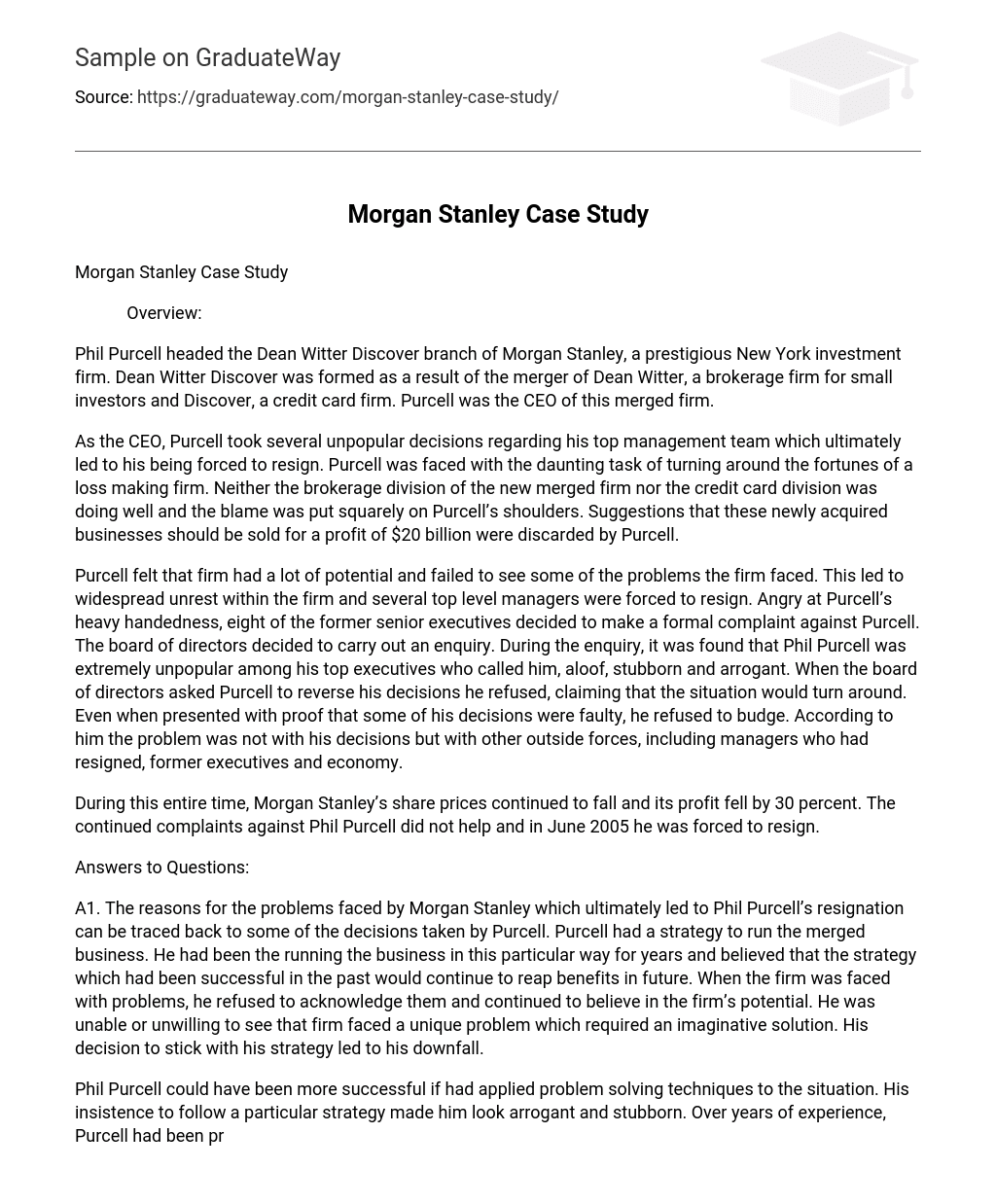Overview:
Phil Purcell headed the Dean Witter Discover branch of Morgan Stanley, a prestigious New York investment firm. Dean Witter Discover was formed as a result of the merger of Dean Witter, a brokerage firm for small investors and Discover, a credit card firm. Purcell was the CEO of this merged firm.
As the CEO, Purcell took several unpopular decisions regarding his top management team which ultimately led to his being forced to resign. Purcell was faced with the daunting task of turning around the fortunes of a loss making firm. Neither the brokerage division of the new merged firm nor the credit card division was doing well and the blame was put squarely on Purcell’s shoulders. Suggestions that these newly acquired businesses should be sold for a profit of $20 billion were discarded by Purcell.
Purcell felt that firm had a lot of potential and failed to see some of the problems the firm faced. This led to widespread unrest within the firm and several top level managers were forced to resign. Angry at Purcell’s heavy handedness, eight of the former senior executives decided to make a formal complaint against Purcell. The board of directors decided to carry out an enquiry. During the enquiry, it was found that Phil Purcell was extremely unpopular among his top executives who called him, aloof, stubborn and arrogant. When the board of directors asked Purcell to reverse his decisions he refused, claiming that the situation would turn around. Even when presented with proof that some of his decisions were faulty, he refused to budge. According to him the problem was not with his decisions but with other outside forces, including managers who had resigned, former executives and economy.
During this entire time, Morgan Stanley’s share prices continued to fall and its profit fell by 30 percent. The continued complaints against Phil Purcell did not help and in June 2005 he was forced to resign.
Answers to Questions:
A1. The reasons for the problems faced by Morgan Stanley which ultimately led to Phil Purcell’s resignation can be traced back to some of the decisions taken by Purcell. Purcell had a strategy to run the merged business. He had been the running the business in this particular way for years and believed that the strategy which had been successful in the past would continue to reap benefits in future. When the firm was faced with problems, he refused to acknowledge them and continued to believe in the firm’s potential. He was unable or unwilling to see that firm faced a unique problem which required an imaginative solution. His decision to stick with his strategy led to his downfall.
Phil Purcell could have been more successful if had applied problem solving techniques to the situation. His insistence to follow a particular strategy made him look arrogant and stubborn. Over years of experience, Purcell had been programmed over the years to do his business in a particular way. When faced with a challenging situation, he continued to use programmed decision making techniques. He could have been more successful if instead he had used non-programmed decision making techniques to solve the problem of lowered sales in the merger. Instead he chose to ignore the facts and information available in the hope that things would turnaround. This alienated his top management team which ultimately led to Phil Purcell having to resign as the CEO.
A2. Phil Purcell had a tendency towards escalation of commitment. We know this because he stuck to his belief and refused to look at alternatives. His approach in face of problems was extreme, preferring to use a tried and tested formula, even if it meant alienating his core team members. He had publicly endorsed his strategy and found it difficult to go back on them. As his decisions began to backfire, he found himself more and more under pressure and continued to back his decisions, even wrong ones, leading to a further escalation of commitment. As he continued to get negative results, his approach became more and more orthodox and he continued to take the extreme alternative in the hope that things would turnaround and he would be vindicated. When his top management began to resign and former executives lodged complaint against him to the board of directors, he felt further threatened and became even more radical in his approach.
Phil Purcell would have better served Morgan Stanley and himself by adopting a more moderate approach. When he found his business decisions giving negative returns, he should have realized and accepted that there was a problem with his strategy and devised an alternate plan. His insistence to pursue a failed strategy escalated the commitment and led to the situation where he was forced to resign.





